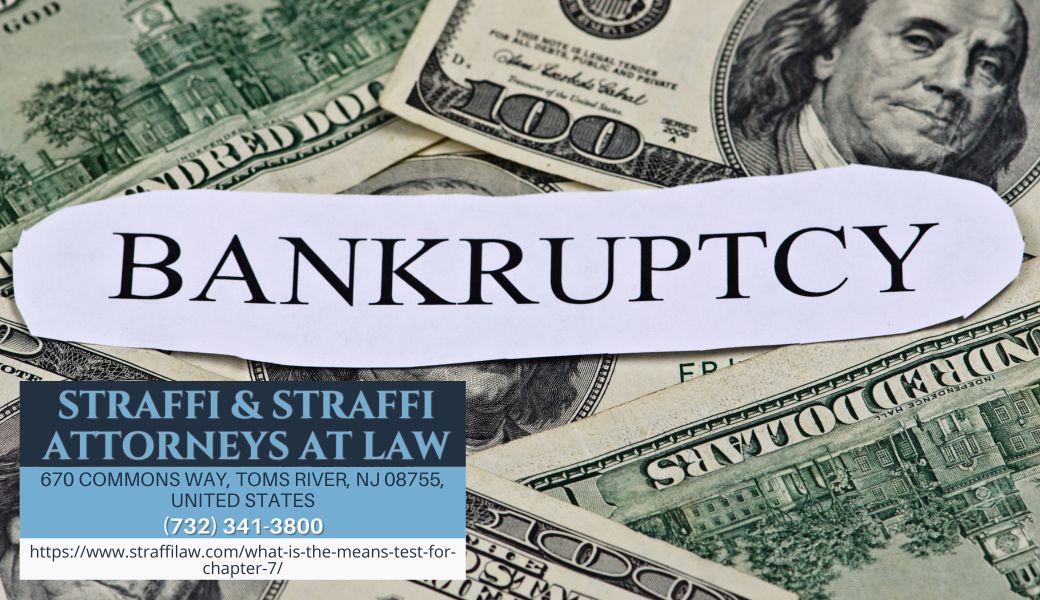New Jersey Chapter 7 bankruptcy attorney Daniel Straffi (https://www.straffilaw.com/what-is-the-means-test-for-chapter-7/), of Straffi & Straffi Attorneys at Law, has recently provided valuable insights into the Chapter 7 means test, an essential step for individuals seeking to file for bankruptcy in New Jersey. The means test plays a critical role in determining whether a debtor is eligible for Chapter 7 bankruptcy, a process that offers debt relief by allowing individuals to discharge unsecured debts such as credit card balances and medical bills. According to Daniel Straffi, this tool helps ensure that only those who genuinely need financial relief are able to file for Chapter 7.
Filing for Chapter 7 bankruptcy can offer a fresh start for individuals overwhelmed by debt, but passing the means test is a crucial first step. In the article, New Jersey Chapter 7 bankruptcy attorney Daniel Straffi emphasizes the importance of understanding the means test and how it applies to New Jersey residents. This test, as Straffi explains, serves to evaluate a debtor's financial situation by calculating whether their income, after allowable expenses, falls below the threshold for eligibility. Meeting these requirements can allow individuals to move forward with filing for Chapter 7 and take control of their financial futures.
Straffi, a New Jersey Chapter 7 bankruptcy attorney, outlines that the means test was introduced as part of the Bankruptcy Abuse Prevention and Consumer Protection Act (BAPCPA). This federal regulation aims to prevent abuse of the bankruptcy system by limiting high-income individuals from discharging their debts through Chapter 7. Instead, those who earn too much are directed toward Chapter 13 bankruptcy, which involves a structured repayment plan. As Daniel Straffi explains, the means test helps differentiate between individuals who have the capacity to repay their debts and those who genuinely need debt relief through Chapter 7.
For residents of New Jersey, the means test compares household income to the state’s median income levels. Straffi states, “If your income falls below the median, you are presumed eligible for Chapter 7 bankruptcy. If your income is higher, the test goes further to calculate your disposable income after deducting necessary expenses.” These deductions include costs for housing, transportation, and other basic living expenses based on IRS standards, as well as health care costs. The purpose of this extended calculation is to grant only those with little to no disposable income the financial relief provided by Chapter 7.
In the detailed breakdown, Straffi explains that the means test is a two-step process. The first step compares the debtor's income over the past six months to the median income level in New Jersey. If the debtor’s income is lower than the median for their household size, they automatically pass the means test. The median income thresholds are updated regularly, and as of 2024, the median income for a household of one in New Jersey is $83,102, while a family of four must have an income below $157,404 to qualify.
If a debtor’s income exceeds the state median, the means test proceeds to a second phase, where allowable living expenses are deducted to determine disposable income. These expenses include essential costs like housing, utilities, transportation, and food, as well as necessary business or employment-related expenses. Straffi highlights the importance of these deductions: "These allowable expenses help ensure that the means test reflects a true picture of an individual's financial situation, considering the cost of maintaining a basic standard of living."
After deducting these expenses, the test calculates the remaining disposable income. If this amount falls below the threshold, the debtor is eligible to file for Chapter 7 bankruptcy. However, if the disposable income exceeds the limit, the debtor may be required to explore other options, such as Chapter 13 bankruptcy, which involves repaying a portion of the debt over time.
Daniel Straffi also addresses common concerns about failing the means test. "Failing the means test doesn't necessarily mean you're out of options," Straffi explains. In such cases, individuals may still qualify for Chapter 7 if they can demonstrate special circumstances that justify their financial situation. For example, significant medical expenses or military service-related obligations can sometimes influence the results of the means test. Straffi advises that debtors provide detailed documentation to support any claims of special circumstances in order to pass the test.
New Jersey residents struggling with debt are encouraged to seek legal advice from Straffi & Straffi Attorneys at Law to evaluate their eligibility for Chapter 7 bankruptcy. With a thorough understanding of the means test and the entire bankruptcy process, Daniel Straffi and the team can provide essential guidance to help clients achieve financial relief.
About Straffi & Straffi Attorneys at Law:
Straffi & Straffi Attorneys at Law is a bankruptcy law firm in New Jersey. With years of experience, the firm is well-versed in guiding clients through Chapter 7 and Chapter 13 bankruptcy processes, offering personalized legal solutions tailored to individual financial circumstances. Led by New Jersey Chapter 7 bankruptcy attorney Daniel Straffi, the firm is dedicated to helping individuals and families achieve financial freedom through skilled legal representation.
Embeds:
Youtube Video: https://www.youtube.com/watch?v=AUdEE_Ttd1I
GMB: https://www.google.com/maps?cid=18340758732161592314
Email and website
Email: familyclient@straffilaw.com
Website: https://www.straffilaw.com/
Media Contact
Company Name: Straffi & Straffi Attorneys at Law
Contact Person: Daniel Straffi
Email:Send Email
Phone: (732) 341-3800
Address:670 Commons Way
City: Toms River
State: New Jersey 08755
Country: United States
Website: https://www.straffilaw.com/

